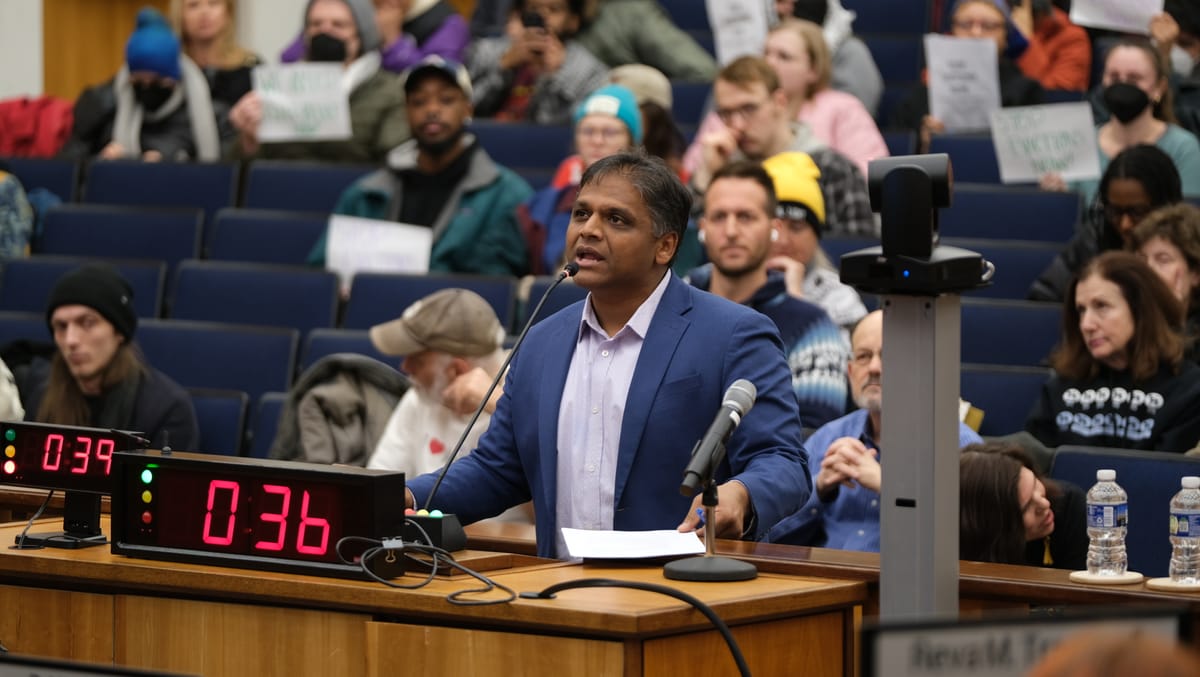Avula says review of Richmond water crisis should take around 30 days

Richmond Mayor Danny Avula told the City Council Monday night that he wants to move quickly with the independent review he’s promised to figure out exactly why the city’s water plant failed last week and what can be done to prevent a repeat.
In a presentation to the council, Avula said he intends to work with the governing body on the selection of a company with expertise in water systems and no “pre-existing relationship with Richmond.” He said he still hopes the city can find a contractor this week, and expects a 30-day turnaround for the completion of an after-action report.
“We really do need an independent analysis,” Avula said. “All of us are very aware of the current state of trust.”
The mayor, a former public health official who just took office on Jan. 1, didn’t reveal much new information on the crisis apart from sharing his broad thoughts on how the city should move forward.
The nine-member council did not press the mayor or any other city officials for more information at the meeting, appearing content to stick to mostly scripted messages rather than a robust public discussion of what city residents and businesses experienced during the water outages.
Councilor Reva Trammell (8th District) was the only member who attempted to ask Avula a question. When she tried, she was initially cut off by Council President Cynthia Newbille (7th District), who — after thanking Avula for his “extraordinary service and work” — said the council would not be getting into a back-and-forth with the mayor.
“Oh my god, I don’t believe this,” Trammell said. “Why are you doing this? You sit up here and you’re praising him about all the great things he has done. I have a right to ask a question.”
Trammell asked Avula to verify the 30-day deadline he had given for the water investigation. The mayor said that is the city’s “anticipated timeline.”
Trammell then indicated she was not seeking to attack Avula, saying “this is no fault of yours.”
“You’re doing a good job and I’m sorry that you’ve come in to this,” she said.
She then called attention to a 2022 inspection report from the U.S. Environmental Protection Agency flagging a variety of issues and apparent neglect at Richmond’s water plant, saying she knew nothing about that document until the recent crisis.
Newbille said the entire council now has that EPA inspection, but the body quickly moved on with the rest of its fairly light meeting agenda. A council staffer said the water issue would come up for more discussion at future meetings, and Newbille invited council members to file their water-related questions with staff and presumably receive answers later.
Avula’s takeaways
As the city continues to sort through the fallout of the water emergency — which officials have said was caused by a weather-induced power outage that then led to flooding and equipment failures — Avula said he anticipates a three-phase response.
First, he said, the city should speedily gather the facts about what happened and an understanding of what immediate staffing and infrastructure changes need to be made.
“I’m hoping that can happen fairly quickly,” he said. “The closer we are to the incident, the better the after-action review will go.”
He said he envisions a second phase, which could take several months, that will involve strengthening the city’s “emergency preparedness culture.”
“How do we make sure that our teams are practicing emergency response, so that in the event we can actually appropriately respond?” he said.
The longer-term phase, the mayor said, should involve a regional discussion about what the greater Richmond area can do to make itself less reliant on a single water plant and a single source of water.
“This really feels like an opportunity to look at the whole regional water system and figure out what long-term investments can we make that create multiple sources of water,” Avula said, saying he anticipates that phase to last a decade or so and potentially cost billions of dollars.
Avula also said regional civic leaders are reactivating a relief fund used during the COVID-19 pandemic to raise money that can be used to assist people and small businesses that suffered financially from the water crisis. To assist with that effort, Avula said, the political PAC that was going to finance his now-cancelled inauguration festivities has contributed $25,000 to the fund.
The city has announced a payment grace period for some City Hall bills after last week’s crisis. Avula stressed Monday that Richmonders “won’t be billed for water they didn’t use,” seemingly in response to some calls for the city to potentially void water bills entirely.
Though the City Council didn’t use Monday night’s meeting to press for more details on the water failure, several members thanked Avula for his leadership and praised the Richmond community for showing resilience and neighborliness in tough times.
“This crisis certainly tested us,” said Councilor Katherine Jordan (2nd District), who said the council will be digging further into the water crisis at a committee meeting next week. “It will continue to. But I believe we’re up to the task. Because we have to be.”
In an interview last week, newly sworn in Councilor Kenya Gibson (3rd District) stressed her desire for an independent assessment of the water situation that brings true oversight rather than city officials themselves steering the investigation.
“I think that the public is going to want to see that kind of separation,” Gibson said.






